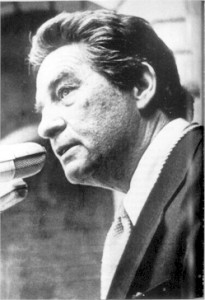Octavio Paz received some seriously impressive accolades during his lifetime: he won the Nobel Prize in Literature in 1990, the Neustadt International Prize for Literature in 1982, and for a period he held the Charles Eliot Norton Professorship of Poetry at Harvard University (an honor bestowed upon the likes of T.S. Eliot and Robert Frost). Beyond his resume, though, is a body of truly beautiful creative work. When I came upon his poem “Between Going and Coming,” I immediately thought of SevenPonds.
I view the piece as an expression of the shock that follows hearing of a death, particularly of a death of someone close to you. The poem’s multiple paradoxes help articulate this complex, often difficult to describe, feeling. For example, Paz writes, “The circular afternoon is now a bay/where the world in stillness rocks” (4-5). Obviously something that is “still” wouldn’t “rock,” but when you are blindsided by devastating news, there is a tendency to feel simultaneously frozen and reeling. Like a boat on a bay, you waver without trying to.
The next two lines continue this theme of opposites: “All is visible and all elusive,/all is near and can’t be touched” (6-7). In that moment, everything seems so much more exposed, and yet everything seems to escape you, too. Even tangible things feel as if they are beyond your reach. It’s as if you have been knocked over and haven’t quite recovered yourself yet. As Paz states, “Paper, book, pencil, glass,/rest in the shade of their names” (8-9). The objects that surround you seem so much more stable, at ease, than you are at a time like this. While you can barely comprehend yourself, inanimate objects seem sturdy and unmoving. In your state of shock, time feels as if it has stopped: “Time throbbing in my temples repeats/the same unchanging syllable of blood” (10-11). Despite the fact that you know that time is moving, it feels like the world has utterly stopped spinning; time is “unchanging.”
And as telling as all of those lines are, I think the final four convey the most:
I find myself in the middle of an eye,
watching myself in its blank stare.
The moment scatters. Motionless,
I stay and go: I am a pause. (14-17)
The uninvited out-of-body experience that sometimes accompanies shock is described perfectly here: you “find” yourself in that situation, rather than willing it to happen, and yet it reveals nothing. The “stare” is “blank,” but you are unable to do anything about it. Finally, when “the moment scatters,” you are still left feeling helpless. This is what the poem means by, “Motionless,/I stay and go…” In this moment of shock, you are simply “a pause.” You know that the feeling will pass, but you’re not sure when. I can’t think of a better way to describe that experience.
Related Reading:
- “Conveying Grief Realistically” (SevenPonds)
- An interview with Octavio Paz

 “Between Going and Coming” by Octavio Paz
“Between Going and Coming” by Octavio Paz




 “Other Side” Documents Woman’s Fight To Die As She Wishes
“Other Side” Documents Woman’s Fight To Die As She Wishes
 The Other Death in the Family
The Other Death in the Family















